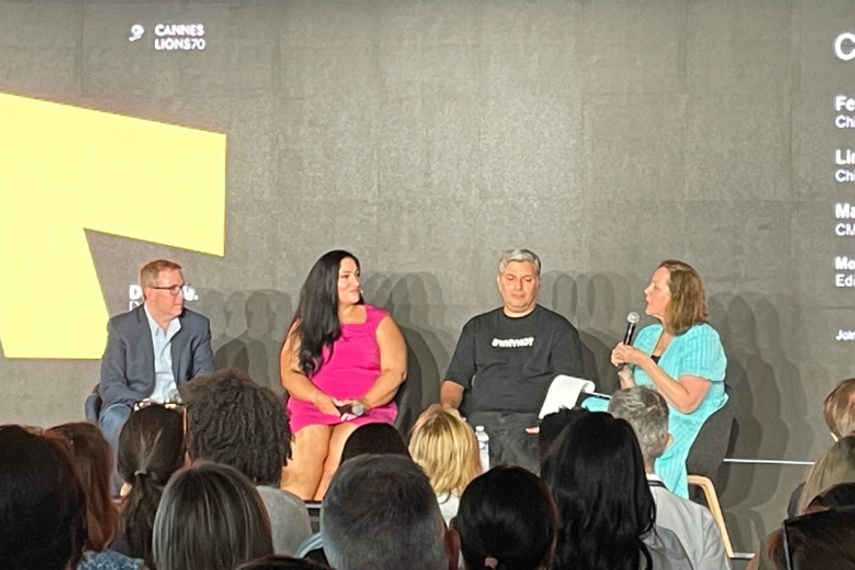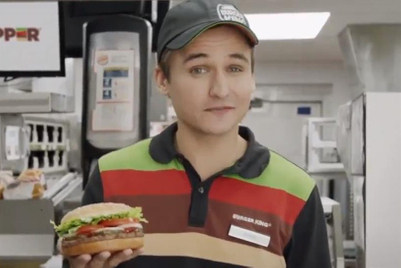
Day one of the 70th edition of the Cannes Lions International Festival of Creativity saw Fernando Machado, chief marketing officer, Not Co, Lina Polimeni, chief corporate brand officer, Eli Lilly, and Mark Kirkham, chief marketing officer – international beverages, PepsiCo, discuss challenges and opportunities marketers face.
Jenni Middleton, SVP content and editor-in-chief, Lions, was the moderator.
The panel kicked off with Machado talking about the role of marketing and how it has evolved.
“We are overwhelmed with change. Every year there’s something new that comes up. I’m curious about these changes, but I learn and read old marketing strategies because I want to do the basics right. That helps me learn,” said Machado.
He stated that his career trajectory reflected that as he moved after an 18-year stint with Unilever to Burger King and then to Activision Blizzard before his current role at Notco.
“I put myself in positions where I’m learning with these roles,” he added.
Responding to Middleton’s question about the basics of marketing he was referring to, Machado said, “Don’t be a shitty client. Do the right research. Do performance marketing the right way. Doing these things can work well for you,” he said.
He added that the marketing fraternity is changing rapidly with mentions of the Metaverse and AI.
“Last year, everyone was talking about the Metaverse. Now that’s gone, and it’s back to talking about AI. God knows what it’ll be next year,” stated Machado.
Machado also mentioned how chief marketing officers need to be seen as the right arm of the chief executive officers.
“The role of the CMO has evolved, and marketing has gone beyond the 4Ps. Marketing is the driving force of the company now. If the right hand of the CEO is the CFO, then that’s not going to end well,” he added.
On the topic of the role of marketing changing, Polimeni stated that it’s important for brands to keep up with culture.
“Brands are evolving, but cultures are changing faster. So, you have to have a vision for the organisation to stay ahead of the game. We have to see how the product fits in the consumer journey. The way we reach out to them has changed massively. We have to move at the speed of culture,” she said.
Middleton then brought out the common notion that everyone can be a marketer and asked Kirkham what he thought about that.
“We (marketers) have to build a craft, and that depends on a lot of people. As CMOs, we have to work with agencies to push boundaries but stay within the brand framework. We have to do this from a global mindset. This concept of flexibility in framework is real and needs to be followed,” he said.
Marketing as a growth driver
Kirkham then emphasised the need for marketing to be seen as a growth driver.
“You can now measure growth in many ways. The main driver for growth is great advertising. That’s one of the things we need to do to grow our business. Then it’s about the community – when we grow, so will our bottlers,” said Kirkham.
On the topic, Polimeni added, “Now, the role of the CMO is to be the relentless defence point for why we need creativity. The marketing team has to be the ambassador for creativity.”
Machado added the importance of going with one’s beliefs. “You can measure a campaign only after the work is out. The company is always worried about short-term results, and yes that needs to be delivered too, but go with your belief. If it doesn’t do well, you can use that as a learning and do better next time,” he said.
‘Stunt’ advertising
When asked about advertising that’s created to win an award or just as a stunt, Machado said, he doesn’t care what it’s labelled.
“If people noticed it, I don’t care if it’s a stunt. For the Moldy Whopper, we removed artificial preservatives and showed that. We had companies around us also creating stunt advertisements. Some took notice, some didn’t. Whatever you do, whether it’s a stunt or not, make sure it’s noticed.”
The talk ended with Middleton asking the panellists how can they convince their teams to be less safe.
Speaking about the pharma industry in which Polimeni operates, she said, “We want to be safe because there are consequences if you don’t. Regulations are there for a reason. People are hired to tell us what we can do and what we can’t. Our job is not to push the boundary, but to reach out to the customer on the other side of the counter.”


.jpg&h=334&w=500&q=100&v=20250320&c=1)
.jpg&h=334&w=500&q=100&v=20250320&c=1)
.jpg&h=334&w=500&q=100&v=20250320&c=1)




.jpg&h=334&w=500&q=100&v=20250320&c=1)







.jpg&h=268&w=401&q=100&v=20250320&c=1)


